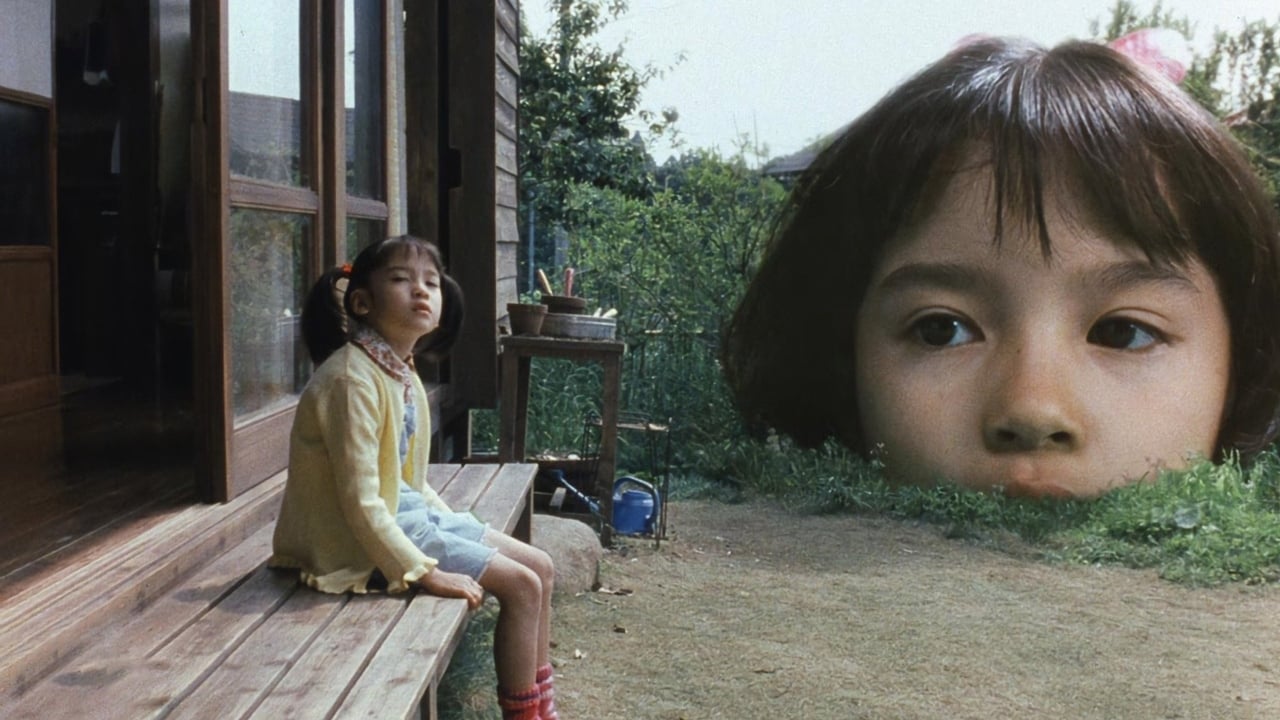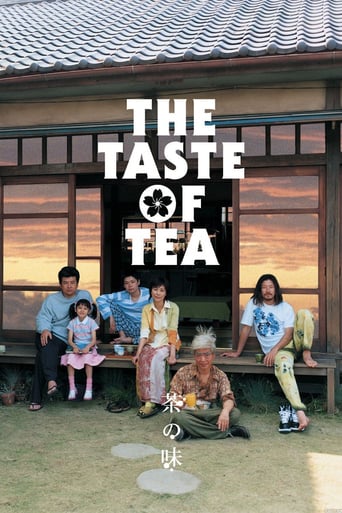Contentar
Best movie of this year hands down!
Tobias Burrows
It's easily one of the freshest, sharpest and most enjoyable films of this year.
Cassandra
Story: It's very simple but honestly that is fine.
Allissa
.Like the great film, it's made with a great deal of visible affection both in front of and behind the camera.
politic1983
Asian cinema, good Asian cinema, can typically be hard to come by in the UK, with increasing difficulty, despite the increasing nature of media communications and online shopping and streaming. I like my Japanese cinema (well, not mine personally) and I find myself often frustrated with the lack of access to some of the better films on offer. But, locating a Korean, Region 3 DVD copy of Katsuhito Ishii's 'The Taste of Tea'; and sourcing a Japanese (thank God for Region 2!) copy of Kore-eda Hirokazu's 'Maborosi' - both featuring English subtitles - I set about watching two films considered towards the better end of Japanese cinema over the last two decades.One thing that interests me about both of these films is that their Japanese titles both feature the hiragana の('no'): 'Cha no aji' ('The Taste of Tea')and 'Maboroshi no hikari' ('Illusionary Light'). Both incorporating the Japanese possession particle, I thought that good enough a reason for comparison. The Japanese have noh theatre, so here's a bit of 'no' cinema...Both also star TadaNObu AsaNO. Starting with 'The Taste of Tea', as I watched that second, we see a film that can be described by unimaginative minds as 'quirky.' Looking at the lives of the HaruNO family, each has their own little story within the film and a mini-battle they want to overcome: the young daughter keeps seeing giant versions of herself; the son struggles with the fairer sex, hoping his go skills can woo; the uncle wonders aimlessly on his visit from Tokyo; the mother tries to re-ignite her animation career; the grandpa with his unusual habits. The most ordinary member of the family is the father, regularly away at work, but acting as the straight man to keep the extraordinary bunch together. And so is the situation in the lives of this Tochigi family, going about their strange ways each day in their sleepy town. But as the film develops, each family member unwittingly looks to another for support in overcoming their personal strife: the uncle helps the daughter with a 'crap' story from his childhood; the son practices go with his father; the grandpa poses for the mother's animation design; as well as helping out with the studio recording of the estranged brother's strange musical ambitions. 'The Taste of Tea' is a typical film about nothing, with no real plot to speak of, but more a series of scenes between the main characters. With a long running time, it could perhaps bore many, though the film has enough humour to keep entertained, with various sub-plots switching the attention so as not to make any one character become tired. But the real story here is one of family and how they all keep each other going, however unconventional the methods may appear. The bizarre grandpa proves to be the head of the family, watching over them all in his own idiosyncratic way. The characters are strange, the special effects are strange, yet it is somewhat of a familiar portrait of family life. Kore-eda Hirokazu is a director that is known for his films about stranger aspects of modern family life, with abandoned children, separated siblings and half siblings and switches at birth. However, whereas Ishii's is more a view of the strength of family ties, Hirokazu looks more at the strain the unusual scenarios can put on families in the modern world. One of his earlier films, 'Maborosi' looks at another unusual family scenario: Yumiko has a seemingly idyllic life in Osaka with her young husband - they are able to laugh and joke and look forward to the birth of their unborn child. However, unexplained and suddenly, Ikuo, her husband, commits suicide on local train tracks, leaving Yumiko's life in twilight. Re-marrying a steady widower, she moves to his small fishing hometown to live with his father and daughter. However, Yumiko's life lacks colour, seemingly in a daydream, struggling to come to terms with the loss of her first husband and the mystery around his death. 'Maborosi', therefore, is somewhat of a bleak film, creating a feeling of numbness. With the situation unresolved for Yumiko, Hirokazu chooses to shoot the entire film in twilight. The translation of the Japanese title, 'Imaginary Light', fits the film's tone perfectly. Similar to 'After Life', the colours of the screen are incredibly vivid and memorable, with a unique and haunting quality. In that sense, 'Maborosi' is a visual masterpiece of cinema, using colour perfectly to reflect the story. One of the best reviews I've read of 'Maborosi' described it as a if having 'read a haiku.' This is perhaps the best way to summarise this film: it paints a perfect picture of a woman's torment at her husband's death, yet maybe lacks any sense of journey; it paints the picture of an emotion, rather than telling a story. The film's revelation at the end comes as fast and as sudden as Ikuo's death, though maybe feels somewhat cheap and easy. This is a masterclass in the use of colour in a film, though perhaps the story and characters could be painted with a little more of that colour as well. 'The Taste of Tea' and 'Maborosi' are two films about unconventional families, though that is perhaps where the similarity ends. Both are slow films with little in the way of plot, but their outlook and style couldn't be more polemic. The joy of family life in 'The Taste of Tea's' is counteracted by the brooding mourning of 'Maborosi'. Colour is a word important to both: 'The Taste of Tea' brilliantly creates colourful characters and anecdotes to entertain; whereas 'Maborosi' uses colour to further the tone and mood of the film. While for different reasons, both are examples of brilliant film- making in their own right...It might just depend what mood you're in, no?!
largu
Yes, so I gave "The taste of tea" a full 10 score. It's not something I do lightly, mind you. How come a whimsical, Japanese, slice-of-life flick makes me go to such length? Let me count the ways...Ishii has, as many contemporary Asian directors, shown much promise but never really gone all the way. However, the first time I read about "The taste of tea" I got the feeling that 'this might be the one', and yes, finally, it was.The story revolve around a family with unusual, but not unbelievable people who go about their slightly odd, but not unconvincing lives. It's all a bit like in those "celebration of life" type of movies which were banned during the sixties, or at least moved to Balkan; But slower. Much slower. In a good way. Is that even possible? Yes it is. The younger son in the family is more of the main character than the others but his story is strangely enough the one that touches me the least. His the little sister is far more interesting with her BIG imaginary-friend problem. My favourite of the lot is of course grandpa, an retired animator who spends his time enjoying life and coming up with fantastic songs like "Why are you a triangle?" and "The mountain is alive". "The mountain is alive" has nothing to do with "sound of music" but its performance would still beat Julie Andrews any day, at lest in the eyebrow-bowlcut-polyester-and-pure-style area.And yes, the style... Call it impressionism or magic realism but the heightened visual language actually works here. There are some computer graphics but its made with a big pounding digital heart. Watching "Taste of tea" is like taking a stroll on a nice spring day. Its beautifully executed with charm, wit, soul, and dare I say it... sublimity? It soothes the mind and it even makes me like humanity, something which requires an ever increasingly effort these days. Sure, its not for everyone but since I'm reviewing it now, I call it one of the very few flawless gems out there. Pure bliss.
aryem
Cha no aji is a great Japanese film. In trying to answer a friend's question "What does it resemble?", All I thought of was "Le fabuleux destin d'Amélie Poulain" and Haruki Murakami's two superb and fantastic works: "Super frog saves Tokyo" short story and his novel "Dance, dance, dance".This film is more about sensations rather than following a plot. And what makes it so interesting and powerful is that the exploring of those sensations have to do more with the viewer's than with those shown by the characters.Original, imaginative, funny, silent, and insightful. As the title suggests, you may as well try to watch it enjoying the taste of tea.
Mab890
Note: I am your classic American teenager, I love violent movies. So naturally I was one to show reluctance when a friend suggested that we go see this movie at the NYC underground Asian film festival. Needless to say from my summary I was not disappointed.The first thing to say is I can not think of any other movie that is anything like this movie and although I did insult myself before I have quite good taste in movie and by violence I was more or less leaning towards Pulp Fiction and Clockwork Orange. A taste of tea is simply about a family. Each character in the family has a little conflict, and as any movie the conflict attempts to be resolved as the movie goes on. They aren't eccentric conflicts at first glance, but as the movie continues the complexity grows. Their stories are not very intertwined except for the fact that it is all the same family. Nevertheless there are moments that want to bring you to tears.Despite all this I would not call the movie sappy to the least bit. The movie is full of crazy imagery and at the same time is quite comical. To say the least its light hearted. But during countless scenes the audience would burst out in laughter.To finish up, this movie is an absolute must see. Find it, buy it, rent it, watch it. In an age where it is almost impossible to find a good movie I am surprised that this movie did not surface long ago.

